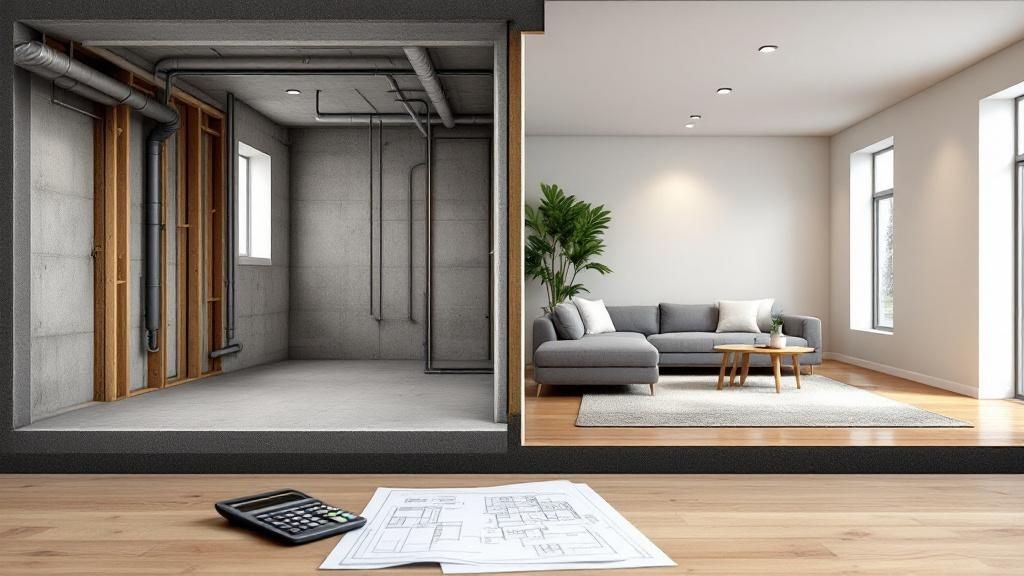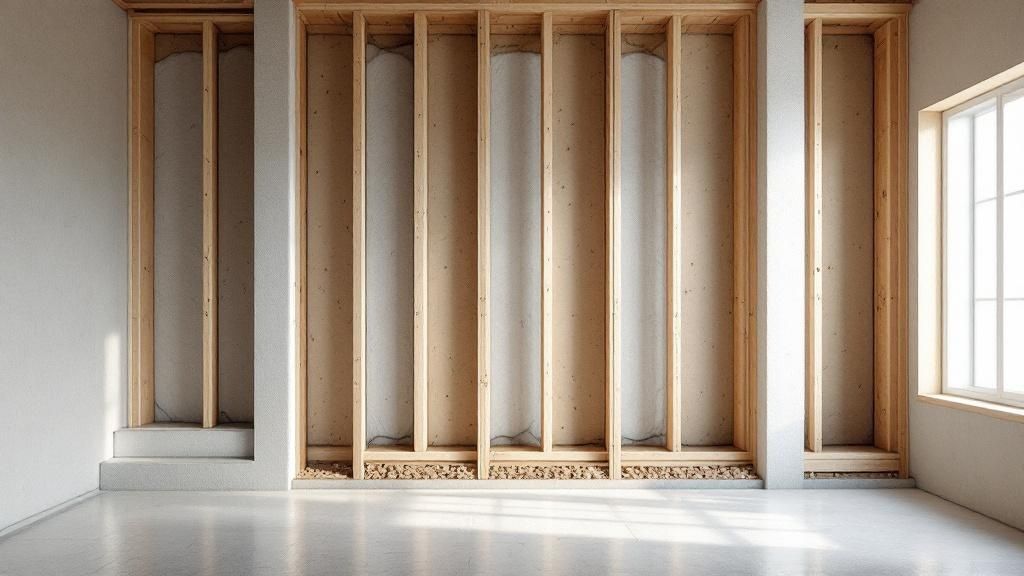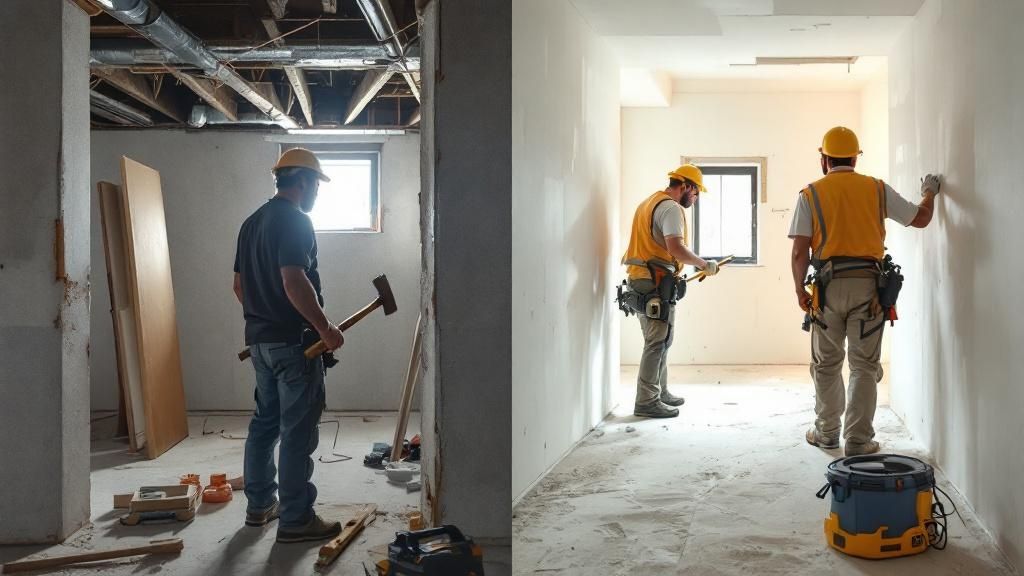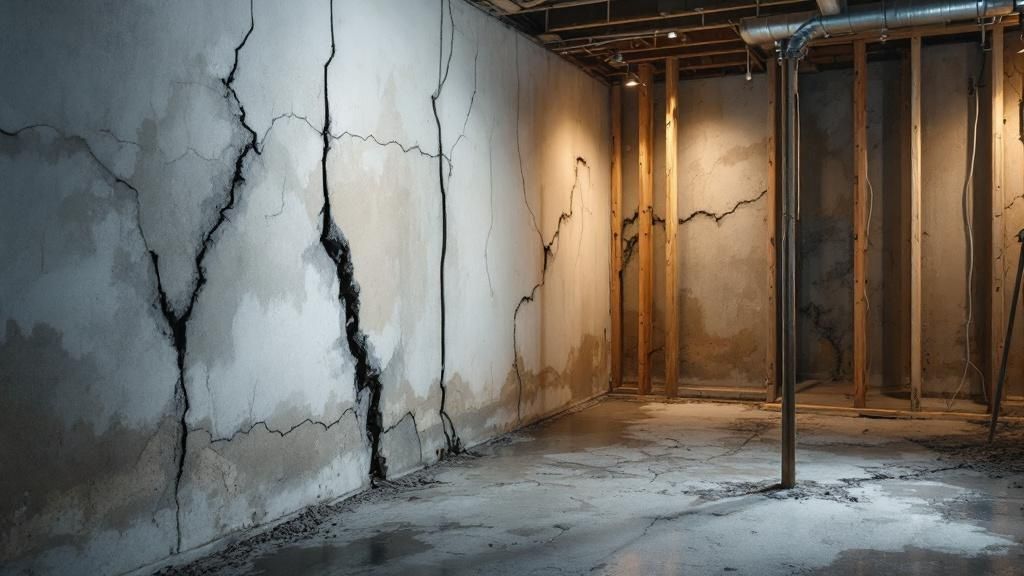Planning a renovation? Understand the true basement completion cost in Vancouver and the Fraser Valley with our guide to budgets, ROI, and local factors.
READ MORE
So, what's the real cost to finish a basement in British Columbia? The honest answer is that it varies—a lot. You'll typically see numbers ranging from $35 to over $100 per square foot, all depending on how ambitious your project is and the quality of finishes you pick out.
For a standard 1,000-square-foot basement in Vancouver or the Fraser Valley, that translates into a total investment of anywhere from $35,000 for a simple, open-concept room to well over $100,000 for a high-end, legally permitted secondary suite.
Before you start picturing where the sofa goes, it’s crucial to get a handle on the financials. Finishing a basement isn't a one-price-fits-all job; it’s a spectrum. Your final cost is shaped by what you want to achieve, the current state of your basement, and the realities of the local market in places like Vancouver, Surrey, and Langley.
Think of it like this: are you painting on a fresh, blank canvas, or are you restoring an intricate old mural? Both lead to a beautiful result, but the starting point completely changes the effort and the budget required. Your vision for the space is the number one cost driver. A simple, open family room and a fully independent legal suite designed to generate rental income are two very different projects with two very different price tags.
To give you a better feel for the costs involved in Metro Vancouver, here’s a quick breakdown for a typical 1,000 sq. ft. project.
As you can see, the jump to a legal suite is significant, but so is the potential return on investment.
Let's unpack what goes into these different levels. A basic renovation is all about creating a clean, livable space. We're talking framing, insulation, drywall, standard lighting, and a solid floor like vinyl plank. It’s the most direct way to add usable square footage to your home without breaking the bank.
A mid-range project is where you start adding more comfort and function. This could mean building out a three-piece bathroom, creating defined rooms like a bedroom or home office, and choosing nicer finishes. This is where you see upgrades like pot lights, better-quality insulation, and more stylish flooring, all of which nudge the cost per square foot up.
The biggest leap in investment comes with creating a legal secondary suite. This is a full-scale construction project. It means extensive plumbing for a kitchen and a full bathroom, separate electrical panels, specific fire and sound insulation to meet the BC Building Code, and often creating a separate entrance. While the upfront cost is easily the highest, a legal suite can dramatically increase your property value and provide a reliable income stream—a huge factor for anyone thinking about the long-term benefits before selling your home.
Several core elements will ultimately decide where your project lands on this cost spectrum:
Getting a firm grasp of these variables is the first step toward building a realistic budget and making sure your vision aligns with the market realities here in the Fraser Valley and Metro Vancouver.

Before you can even begin to estimate the cost of finishing your basement, you need to get brutally honest about what you’re starting with. Not all basements are created equal, and the existing condition of your lower level is the single biggest factor that will shape your budget.
Think of it this way: are you building a brand-new house on an empty lot, or are you just redecorating a single room? The difference in scope is massive. A raw, unfinished basement is a blank canvas, which is great, but it also means every single element—from walls and wires to pipes and permits—needs to be created from scratch.
This is the classic starting point for many newer homes across the Fraser Valley and the Lower Mainland. You know the look: exposed concrete walls, a bare concrete floor, and visible ceiling joists overhead. You might spot some basic plumbing rough-ins sticking out of the floor and some minimal wiring, but that’s usually it.
Turning a concrete shell into a liveable space is a full-blown construction project. It's a comprehensive job that involves:
Because the work is so extensive, a totally unfinished basement will always sit at the higher end of the renovation budget. For a true blank slate with just concrete floors and walls, you're easily looking at costs upwards of $40,000 or more, especially in urban centres where labour is at a premium. If you want to dig deeper into how the current state of a basement impacts cost, thisoldhouse.com offers some great insights.
Finding a partially-finished basement is like getting a fantastic head start in a race. Maybe a previous owner got ambitious and framed a few walls, hung some drywall, or even installed some basic pot lights. These spaces already have some of the heavy lifting done, which can translate into serious savings on both labour and materials.
Your job here is less about ground-up construction and more about completion and cosmetic upgrades. With the foundational systems often in place, your investment can go directly toward the fun stuff—the elements you’ll actually see and enjoy every day, like flooring, paint, and fixtures.
Key Takeaway: If your basement already has drywall, it’s not just a wall—it’s a powerful clue. It means the framing, insulation, and basic electrical are likely already done and have passed inspection. That one detail can easily save you thousands of dollars and weeks of construction time.
This is another common scenario, especially in older Vancouver-area homes. You have a basement that was "finished" decades ago, but it's a time capsule of bad design choices. Think low ceilings, dark wood panelling, terrible lighting, and a chopped-up layout that makes no sense for a modern family.
These projects almost always demand a full gut renovation. You have to tear everything out before you can start building back new. That demolition phase adds to your labour costs, and it can uncover nasty surprises like hidden moisture damage or ancient wiring that's nowhere near current BC safety codes.
Before you can build that dream media room or legal suite, you first have to bring the space back to a blank slate. This means you need a careful budget that accounts for both deconstruction and reconstruction. Figuring out which of these three categories your basement falls into is the first critical step toward having a productive conversation with a contractor and setting a budget that’s actually based in reality.
So, where does your money actually go when you're finishing a basement? Getting a handle on the financial anatomy of your project is the first step toward managing your investment wisely. The easiest way to think about your total basement completion cost is like a pie cut into a few major slices: Labour, Materials, Permits, and Specialty Features.
The size of each slice will change depending on what you’re planning, but they all come together to form your total budget. Knowing what goes into each category gives you the power to make smart decisions for your Vancouver or Fraser Valley home renovation.
This graphic lays out the primary cost categories you'll be looking at.

As you can see, labour and materials will eat up the biggest part of your investment. Permits and other fees are a smaller, but absolutely essential, piece of the puzzle.
In a high-demand market like the Lower Mainland, your single biggest expense is almost always labour. From the electricians and plumbers to the framers and drywallers, the expertise needed to build a safe, code-compliant space comes at a premium. This is the "human element" of your reno—the skilled hands that actually bring your vision to life.
Labour costs alone typically account for 20%-40% of your total project spend. That number reflects the region's higher wages and the specialized rates for top-tier contractors. In Metro Vancouver, skilled trade labour can range from $70 to over $150 per hour depending on the specialty.
After labour, the materials you select make up the next largest chunk of your budget. The good news? This is where you have the most direct control. Your choices here are like levers, letting you dial the final cost up or down based on the quality and style you're after.
The material list is pretty long and covers every phase of the project:
For a clearer picture of how funds are allocated in a typical project, it’s helpful to review a detailed house renovation cost breakdown.
Below is a sample budget table that shows how your costs might break down for a typical mid-range basement project here in BC. It’s a great starting point for seeing where the major expenses lie.
Keep in mind, this is just an estimate. Your final numbers will depend entirely on the scope of your project, the materials you choose, and the contractors you hire.
Permits are a non-negotiable part of any legitimate basement renovation in British Columbia, especially if you’re adding a legal suite. These fees, paid to your local municipality (like Vancouver, Surrey, or Langley), ensure your project is built to the latest safety and building code standards.
Think of a building permit not as a cost, but as insurance. It guarantees that the electrical, plumbing, and structural work has been inspected and approved by a third party, protecting your family's safety and your home's value.
Permit costs vary depending on where you live but are usually based on the project's estimated value. Trying to skip this step is a huge mistake. It can lead to stop-work orders, hefty fines, and the nightmare scenario of having to tear out finished work for inspections.
Finally, we have specialty features. These are the high-impact additions that truly customize your space but also add a significant amount to the final invoice. They're the elements that transform a basic finished basement into a highly functional and valuable extension of your home.
Key specialty features that really impact the budget include:
Before you get your heart set on these big-ticket items, it's a good idea to run the numbers through a mortgage payment calculator. This can help you see how a renovation loan might affect your monthly finances, letting you balance those dream features with your long-term financial comfort.
Understanding the average cost to finish a basement is one thing, but knowing which specific choices can make your budget balloon is where you gain real control. The final number on your basement completion cost isn’t pulled out of thin air; it’s a direct result of several key decisions you'll make and the existing condition of your space. Getting a handle on these factors is essential for any homeowner in Vancouver or the Fraser Valley who wants to keep their project on track financially.

Think of it like planning a road trip. Your finished basement is the destination, but the final cost depends entirely on the car you drive, the route you take, and any unexpected detours you hit along the way. Some choices are a scenic, winding mountain road, while others are a direct, economical highway.
The single biggest cost driver is almost always the complexity of your floor plan. A simple, open-concept media room or home gym needs far less labour and fewer materials than a multi-room layout with separate bedrooms, a full bathroom, and dedicated storage areas.
Every new wall you add brings more than just lumber and drywall. It means more electrical wiring for outlets and switches, extra HVAC ducting to keep the air flowing, and hours of additional labour for framing, finishing, and painting. It's a domino effect. This is why a simple, open space is always the most budget-friendly route.
On the other hand, a complex design like a legal secondary suite is a huge undertaking that will push your costs toward the highest end of the spectrum. When mapping out your budget, it's crucial to break down all these interconnected expenses, much like understanding the factors influencing project costs for any major service.
Two specific features can dramatically inflate your renovation expenses: bathrooms and legal bedrooms. Adding a bathroom or even a small kitchenette requires extensive plumbing work, and that's one of the costliest trades to bring in.
To get it done right, plumbers may need to cut into your concrete slab to run new drain lines—a messy, labour-intensive, and expensive job. This step alone can add thousands to your bill before you’ve even picked out a sink.
Furthermore, if you plan to add a bedroom, the BC Building Code is very clear: you must have an egress window for safety. This isn't just any window. It has to meet specific size and accessibility rules to serve as an escape route in an emergency. Installing one usually involves cutting a huge opening in your concrete foundation, a major structural job that demands permits, engineering oversight, and specialized contractors.
Your choice of finishes is the most powerful lever you have for controlling the final spend. This is where you can truly dial in your budget to match your priorities, putting your money where it matters most to you.
Just look at the massive cost difference in common materials:
The cumulative effect of these "small" decisions can be massive. Simply choosing mid-range finishes over premium ones across the board can easily save you $10,000 - $20,000 or more on a typical project, without really sacrificing quality or function.
Finally, the scariest cost driver is the one you can't see. Once the old walls and floors come out, you can uncover pre-existing issues that have to be fixed before your project can move forward. These surprises are especially common in older homes around the Vancouver area.
Some of the most common hidden problems include:
For ongoing insights into local renovation trends and the real estate market, feel free to explore our latest news and articles. Staying informed helps you anticipate potential challenges and make smarter decisions for your home.
Finishing your basement is far more than just a home improvement project; it's a savvy financial move, especially in the competitive real estate markets of Vancouver and the Fraser Valley. When you understand the potential return on investment (ROI), the conversation shifts from being about an expense to being about a powerful wealth-building opportunity. Making the right choices can seriously boost your property's value and even open up new income streams.
Finishing a basement is widely seen as one of the smartest value-adding renovations you can do. Here in British Columbia, it’s realistic for homeowners to expect to recoup 50% to 75% of their renovation costs when they sell.
Think about it this way: for a mid-range project costing $70,000, you could be adding anywhere from $35,000 to over $52,000 to your home's market value. And that’s on top of getting to enjoy all that extra living space yourself.
If you want to talk about the single most impactful way to maximize your ROI, it's by creating a legally permitted secondary suite. In a region like ours, grappling with a housing shortage and sky-high rental rates, a basement suite isn't just a nice feature—it's a massive financial asset.
The ability to generate steady monthly income is incredibly attractive to potential buyers, who often see it as a "mortgage helper." This rental income can help you pay off the renovation costs much faster. More importantly, when it's time to sell, a home with a legal, income-generating suite is often valued significantly higher than one without. It opens up your pool of potential buyers to include investors and those who need that rental income to qualify for a mortgage in the first place.
In the Lower Mainland market, a legal suite can sometimes increase a home's value by an amount greater than the initial renovation cost, making it one of the few projects with the potential for over a 100% return.
Not all features are created equal when it comes to ROI. To get the most bang for your buck, you need to focus on additions that add real function and appeal to the widest range of buyers. When you're planning a basement completion, understanding how it can increase your home's value is crucial. Looking into the top projects for maximum home renovation return on investment can give you some valuable context for making smart financial decisions in the tough BC market.
Here are the features that consistently deliver the best returns in our local market:
By focusing on these high-impact elements, you ensure your basement completion cost becomes an investment that pays dividends. To truly understand how these upgrades could affect your property's specific market value, it’s always wise to get a professional opinion. You can get a much clearer picture of your home's potential with a free home evaluation from experts who live and breathe the local market dynamics. This step is key to aligning your renovation plans with real-world financial outcomes.

Starting a basement renovation brings up a ton of questions. If you're a homeowner in Vancouver or the Fraser Valley, getting your head around local rules, timelines, and costs is the key to a project that goes off without a hitch. Let's tackle some of the most common questions we hear all the time.
For most standard basement projects in the Lower Mainland, you can expect the actual construction work to take anywhere from 6 to 12 weeks. That’s the time on-site for things like framing, running electrical, putting up drywall, and getting the final coat of paint on.
But that's not the whole story. Before any hammers start swinging, there's a crucial pre-construction phase. This is where the design, engineering, and permit applications happen. Dealing with municipalities like the City of Vancouver or Surrey can easily tack on several more weeks, or even months, to your total timeline.
Ultimately, how long it all takes boils down to the complexity of your project, your contractor’s schedule, and how quickly the municipal inspections get done. A simple, open-plan family room will always be a much quicker job than a full legal suite conversion with multiple rooms.
Yes. In almost every single case, you will need a permit. Any work that involves structural changes, moving walls, or touching the plumbing or electrical systems requires a building permit in British Columbia. This isn't just a friendly suggestion—it’s the law.
This is especially true if you're creating new living space, and it's absolutely critical if you're building a legal secondary suite. The permit process is there for a reason: to make sure your renovation is safe, structurally sound, and meets all the requirements of the BC Building Code.
Trying to work without a permit is a massive gamble. You risk getting slapped with a stop-work order, facing hefty fines, and running into major problems when it’s time to sell your home or make an insurance claim. A permitted renovation protects both your investment and your family.
While going the DIY route can definitely save you money on labour for cosmetic tasks like painting or laying down some click-lock flooring, taking on the whole project yourself is rarely a good idea. This question comes up a lot when people are trying to manage their basement completion cost.
The critical stuff—electrical, plumbing, and structural framing—should always be left to licensed and insured pros in BC. A mistake in one of these areas isn't just expensive to fix; it can lead to failed inspections and create serious safety hazards, from electrical fires to hidden water damage.
A hybrid approach is often the smartest way to go. Hire qualified tradespeople for the technical work, then save some cash by tackling the finishing touches yourself. This way, you can keep costs down without compromising on safety, quality, or code compliance.
In a hot real estate market like Vancouver, a professionally finished basement adds some serious value. You can typically expect a return on investment (ROI) somewhere in the 50% to 75% range, making it a very smart financial move.
The single biggest value-add? Creating a legally permitted secondary suite. In a city with such high rental demand, a basement suite that brings in steady income is a huge draw for potential buyers. In many cases, this feature can push your home's market value even higher than what you spent on the renovation. If you're a landlord, staying on top of local regulations is vital, and getting professional advice on property management can be a game-changer.
Even if you don't build a full suite, just adding usable living space—like a family room, home office, or an extra bedroom—makes your property far more functional and appealing, which directly boosts its worth on the market.
At Royal LePage Brookside Realty, we know a home renovation is a major investment in your property's future. Our deep understanding of the Vancouver and Fraser Valley real estate markets can help you make strategic decisions that maximize both your enjoyment and your return on investment. If you're thinking about a project and want to understand its impact on your home's value, connect with our team today.